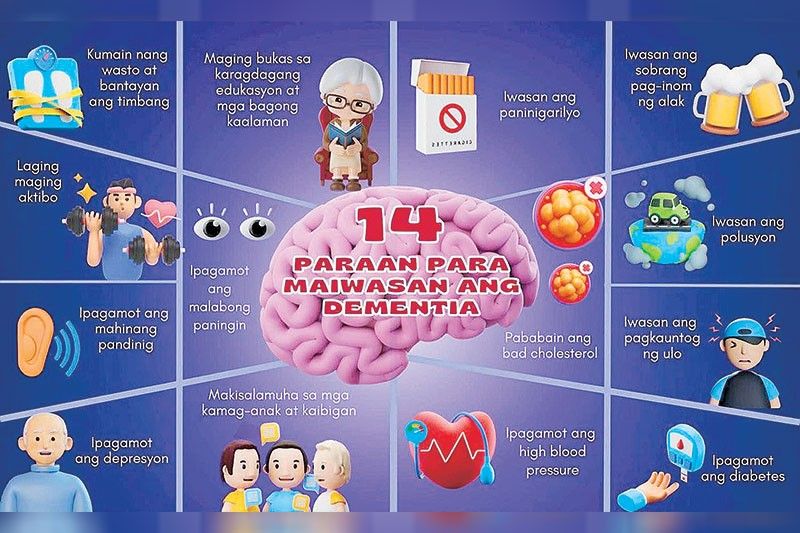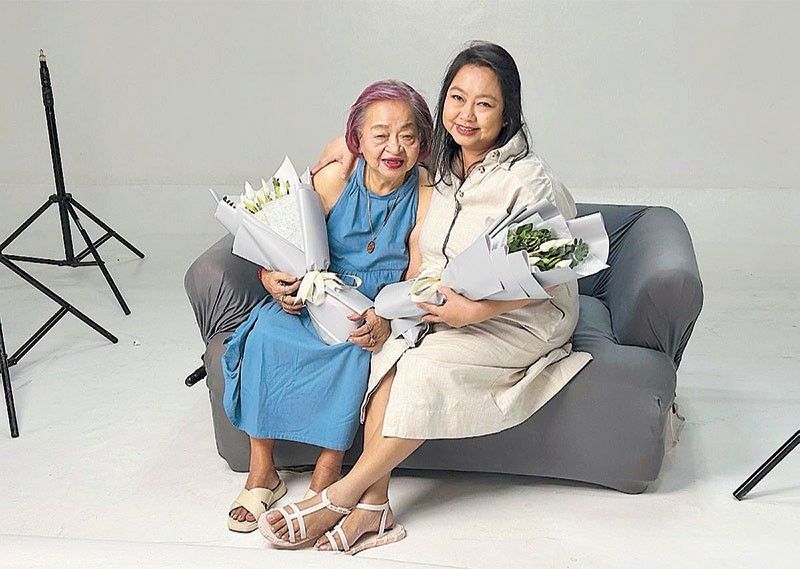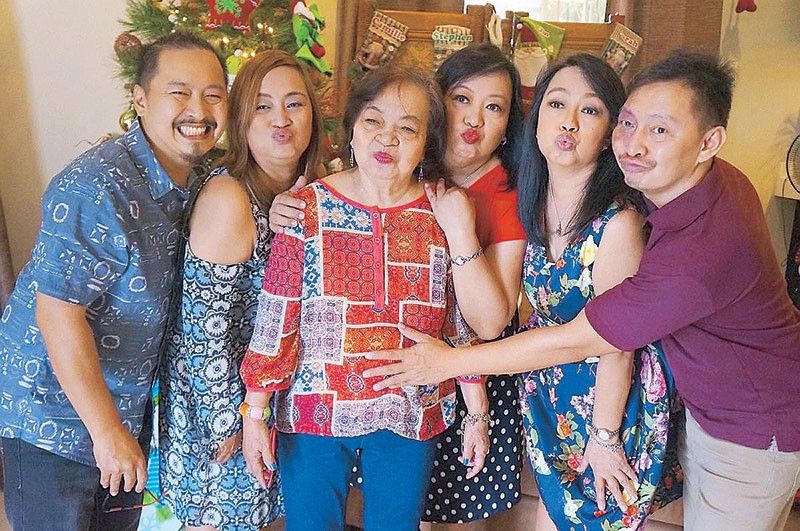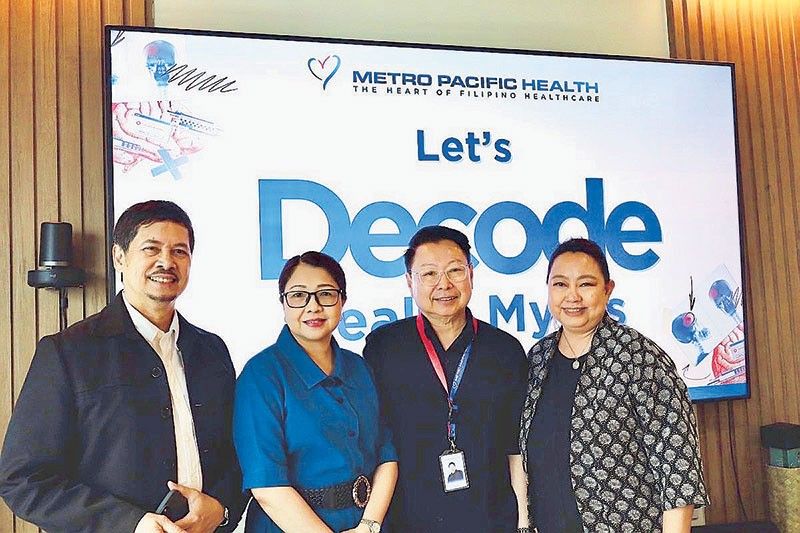The long goodbye


‘The journey of loving and caring for a loved one with dementia is never easy. It can be extremel stressful and quite scary,’ says Isca Abaya of Metro Pacific Health. ‘There’s a reason why it’s called the ‘‘long goodbye.’’ The idea of losing your loved one slowly — while still physically present — is terrifying.’
Are you becoming forgetful? If you find yourself forgetting where you put your eyeglasses, missing deadlines, or forgetting dates — occasionally — don’t fret. Issues with memory and remembering are normal especially as we age.
But if you start forgetting important things like the names of your family members or simple tasks like how to turn on the TV, then it could be a sign of something more serious.
“My mom, Estela, 86, started becoming forgetful after she had a stroke 15 years ago,” shares Jessica “Isca” Abaya, Metro Pacific Health chief marketing and commercial officer. “She would forget where she was at a certain time or what she did a few minutes ago. Sometimes, she would do things repeatedly like counting her money.”
Isca and her four other siblings — Mark, Angelica, Joy and Dr. Joseph — thought being “ulyanin” was normal for their mom’s age.
“What got me worried was when she started having hallucinations,” Isca relates. “She would talk about people in her past, many of whom are no longer around. There were also days when she acted like her 15-year-old self and started talking to us in Chavacano.”
Estela also experienced behavioral shifts.
“From being cheerfully hyperactive one day to being irritable the next. And then sleepy, quiet and withdrawn after,” observes Isca.
Another red flag was when she started accusing her yayas for her missing things. That was very unlikely of her. We were worried that it would strain our relationship with our dependable and trustworthy kasambahays, who have been with us for years.”
And that’s what prompted Isca to seek medical help for her aging mom.

What you need to know about dementia
As we get older, parts of our body start to decline. Our bones tend to shrink in size and density. Muscles generally lose strength and flexibility. Our brain is no exception. Aging causes changes to the brain size, vasculature and cognition. However, there’s a difference about naturally forgetting things and having an impaired memory like dementia.
“Memory loss should not be progressive and should not affect the way you live your daily life,” explains Dr. Michelle Anlacan, head of the Dementia Center, Cardinal Santos Medical Center.
Dr. Anlacan was one of the panelists during the recent “Let’s Decode Health Myths” media roundtable where she shed light on dementia.
Decode is Metro Pacific Health’s (MPH) answer to the Filipinos’ need for health literacy. It’s a video/documentary series that debunks common health myths.
Dr. Anlacan was joined by Dr. Benjamin Co, MPH Group chief of medical care, who talked about the top diseases that Filipinos suffer from like tuberculosis and HIV; and Dr. Saturnino Javier, co-president and CEO of Makati Medical Center, who addressed the widespread misconception that heart disease doesn’t happen to skinny individuals and only presents with symptoms like chest pains.
“Although dementia doesn’t come up on the list of top morbidities — because it’s often not diagnosed — it’s important to raise awareness about this disease because it not only affects the person living with dementia but entire family,” says Dr. Anlacan.
Dementia is an umbrella term that encompasses diseases wherein memory is the primary problem.
During the roundtable discussion, Dr. Anlacan also debunked myths about the disease.
• Forgetfulness is just a normal part of aging. “It’s not. If you think your memory is declining or your family thinks so, then you need to have a memory screening. It only takes less than 30 minutes,” the lady doctor shares. “From there, we can determine if you’re fine or you need proper workup.”

• Dementia is an inevitable part of aging. “False. We’ve seen 85-year-olds with very sharp memory.”
• There’s no treatment for dementia. “Although there is not yet a single medication that can reverse it, we have what we call symptomatic medication,” notes Dr. Anlacan.
“Whatever the problem is, if the patient has agitation or difficulty sleeping, we try to address that. We also have some medications to stabilize the memory. Right now, there are new medications that we call disease-modifying. They try to address the root of the problem. Like in Alzheimer’s disease, we have the accumulation of the abnormal protein called amyloid. The new medications are catered towards removing that.” However, these medications are only viable for persons with very mild dementia. “So if you’ve waited for a long time to get diagnosed, then we can’t help you anymore. Early diagnosis and proper management are key to improving the quality of life of those affected. Also, patient and family education.”
In dementia, there are three stages: Mild (just regular forgetfulness); Moderate (you need assistance with your daily activities); and Severe (you need assistance for everything, including eating). “So if you have a family member with dementia, you may want to know what to expect. Knowledge about the disease is very empowering,” notes Dr. Anlacan. In diagnosing patients with dementia, Dr. Anlacan says they also try to look for reversible causes. “We try to look for strokes, tumors, cysts, hypothyroidism and other conditions that may account for dementia.”My dad, who was recently diagnosed with lung cancer (which has metastasized to his brain), has been exhibiting some of the symptoms Isca mentioned like hallucinations.
He would look for his childhood friends and talk about the places he frequented when he was younger. When he had these episodes, we got scared because he would insist on leaving the house. When someone you love has dementia, you experience a sense of loss even before they pass on.And Isca nailed it when she said: “The journey of loving and caring for a parent or a loved one with dementia is never easy. It can be extremely stressful and quite scary,’ says Isca Abaya. ‘There’s a reason why it’s called the ‘long goodbye.’ The idea of losing your loved one slowly — while still physically present — is terrifying.”

Sharpen your mind before you forget about it
If you or someone you know have been experiencing dementia, it isn’t the end of the road.
“Be patient, understanding, and loving,” advises Isca. “Speak to them calmly. Listen to their concerns and avoid arguing. Reassure the person that they are safe, and that you are there to help.”
Most importantly, seek medical help. “At Cardinal Santos Medical Center, a Metro Pacific Health hospital, we offer memory screening. Treatment plans for dementia are very specific to every patient. It consists of two parts: the pharmacological part, where we try to give medications; and the non-pharmacological, (where) we educate the family as to what to expect, what is this disease and how to deal with it on a daily basis. They can have cognitive rehabilitation and many activities that they enjoy which includes music therapy, painting and others,” shares Dr. Anlacan.
* * *
Metro Pacific Health’s Decode series continues to serve as a vital source for Filipinos seeking accurate health information and is part of MPH’s broader commitment to public health.
While the dementia episode took center stage at the roundtable, MPH also previewed an upcoming episode on colon cancer, underscoring the importance of early screening and early detection.
For inquiries, visit www.metropacifichealth.com.



















